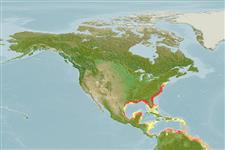Common names from other countries
>
Eupercaria/misc (Various families in series Eupercaria) >
Sciaenidae (Drums or croakers)
Etymology: Sciaenops: Greek, skiaina, skion = a fish, red mullet + Greek, ops = appearance (Ref. 45335).
More on author: Linnaeus.
Environment: milieu / climate zone / depth range / distribution range
पारिस्थितिकी
समुद्री; खारा ड़िमरसल; औशिनोड़िरोमस (Ref. 51243); गहराई सीमा 10 - ? m (Ref. 9988). Subtropical; 15°C - 26°C (Ref. 127841); 43°N - 0°S
Western Atlantic: Massachusetts in USA to northern Mexico, including southern Florida, USA.
Length at first maturity / आकार / वज़न / Age
Maturity: Lm 82.7, range 55 - 80.3 cm
Max length : 155 cm TL पुल्लिंग / अलिंग; (Ref. 3702); common length : 100.0 cm TL पुल्लिंग / अलिंग; (Ref. 3702); अधिकतम प्रकाशित वज़न: 45.0 kg (Ref. 9988); अधिकतम सूचित उम्र: 50 वर्षो (Ref. 32563)
Occurs usually over sand and sandy mud bottoms in coastal waters and estuaries. Abundant in surf zone. Feeds mainly on crustaceans, mollusks and fishes. Utilized fresh and frozen; can be pan-fried, broiled and baked (Ref. 9988).
Robins, C.R. and G.C. Ray, 1986. A field guide to Atlantic coast fishes of North America. Houghton Mifflin Company, Boston, U.S.A. 354 p. (Ref. 7251)
IUCN Red List Status (Ref. 130435)
CITES (Ref. 128078)
Not Evaluated
Human uses
मात्स्यिकी: लघु वाणिज्य; जलीयकृषि: व्यापारिक; आखेट मत्स्य: हां; जलजीवालय: सार्वजनिक लजीवालय
साधन
Special reports
Download XML
इंटरनेट स्रोत
Estimates based on models
Preferred temperature (Ref.
115969): 15.5 - 27.3, mean 24.2 (based on 180 cells).
Phylogenetic diversity index (Ref.
82804): PD
50 = 1.0000 [Uniqueness, from 0.5 = low to 2.0 = high].
Bayesian length-weight: a=0.00832 (0.00523 - 0.01324), b=3.07 (2.94 - 3.20), in cm Total Length, based on LWR estimates for this species & (Sub)family-body (Ref.
93245).
Trophic level (Ref.
69278): 3.7 ±0.57 se; based on food items.
लौटाव (Ref.
120179): माध्यम, न्यूनतम जनसंख्या दुगनी होने का समय 1.4 - 4.4 वर्ष। (K=0.27; tmax=7; Fec~1 million).
Fishing Vulnerability (Ref.
59153): Moderate vulnerability (44 of 100).
Climate Vulnerability (Ref.
125649): Very high vulnerability (88 of 100).
